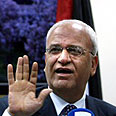
Palestinians: Indirect talks last chance for peace
Top Palestinian negotiator Saeb Erekat tells Israel Army Radio: 'Relationship has deteriorated to stage where US is trying to save peace process with last attempt to see if it can be tool to make decisions between Palestinians, Israelis'
US-mediated indirect talks between Israel and the Palestinians will be a last chance to keep the Middle East peace process alive, the Palestinian chief negotiator said on Monday.
"The relationship has deteriorated to this stage where the US is trying to save this peace process with the last attempt - by the way, mark my words - this will be the last attempt in order to see if it can be a tool to make decisions between Palestinians and Israelis," Saeb Erekat told Israel Army Radio.
US envoy George Mitchell planned talks with Palestinian President Mahmoud Abbas later in the day following a meeting with Israeli Prime Minister Benjamin Netanyahu on restarting statehood negotiations.
Both sides have agreed to indirect contacts to revive talks suspended since December 2008, in a boost to US President Barack Obama's difficult quest to end decades of conflict.
"Today President Abbas will hand a written response to Senator Mitchell about our acceptance of the proposal of the proximity talks," Erekat told Reuters.
The Palestine Liberation Organization endorsed the indirect talks on Sunday, following Arab League backing last week for four months of negotiations which the Palestinians say should focus on security and borders of a future state.
Abbas had demanded a complete halt to Israeli settlement building as a condition for resuming talks and has rejected as insufficient a limited freeze Netanyahu ordered in November under US pressure.
But the PLO and Arab League decisions gave the Western-backed leader political support for re-engaging with Israel without a total settlement moratorium. Netanyahu has agreed to indirect talks, saying he hoped they would lead to face-to-face negotiations.
Leaders' role
Erekat said he hoped Abbas and Netanyahu would take the lead in the coming talks and reiterated the Palestinian outline for a peace deal - a state in the West Bank and Gaza Strip along the lines in place before Israel captured the two territories in a 1967 war, "with agreed swaps".
Israel's previous prime minister, Ehud Olmert, had pursued a peace agreement under which land inside Israel would be transferred to a Palestinian state in exchange for major Jewish settlement blocs in the West Bank.
Netanyahu has not endorsed the concept.
Mitchell, who has been trying to broker a resumption of peace talks for a year, met Netanyahu in Jerusalem for more than two hours on Sunday and held further talks with him on Monday.
Many observers and politicians doubt that the indirect talks, in which Mitchell is widely expected to shuttle, at least initially, between Jerusalem and the West Bank city of Ramallah, can succeed where years of negotiations have failed.
Abbas faces a continuing challenge from the Hamas Islamist movement, which has controlled the Gaza Strip for three years and opposes the US-backed peace efforts.
Netanyahu, who has spelled out his vision of a Palestinian state with limited powers of sovereignty, heads a coalition government that includes political allies of settlers in the occupied West Bank.










